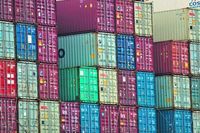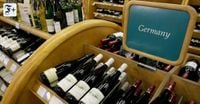In a dramatic turn of events, U.S. President Donald Trump announced significant tariff increases on imported goods, including a staggering 31 percent on products from Swiss export companies. This announcement, made about two weeks ago, sent shockwaves through the global economy, particularly affecting businesses that export to the United States. However, just a week later, Trump declared a temporary suspension of these tariffs for 90 days, reducing the rate to a universal 10 percent for Swiss companies.
This back-and-forth has created uncertainty for many businesses. "We are not directly affected by the U.S. tariffs," said Thomas Kutt, Head of Investor Relations at Ypsomed AG, a company based in Burgdorf, Switzerland, known for its insulin pumps. He explained that their products are not available in the U.S. market and that customers pick up the goods locally, thus exporting them themselves. "Our contracts stipulate that our customers must collect the goods from us, which means they are the ones subject to the tariffs," Kutt added.
Despite the uncertainty, Kutt remains optimistic, believing that Ypsomed will "get away with a black eye." He emphasized that their business model is stable and less dependent on macroeconomic fluctuations, particularly because their products are essential for chronically ill patients. "Ultimately, lives depend on our products, which I believe will keep us safe from high tariffs on pharmaceuticals," he said.
Similarly, Micha Kühne, CEO of Asic Robotics AG, reported that his company is only indirectly affected by the tariffs. Asic Robotics, which specializes in custom machinery and industrial robotics, primarily serves European markets. "The uncertainty surrounding U.S. tariffs means we are unlikely to initiate sales activities in the U.S. in the near future," Kühne noted. He expressed concerns that the price and competitive pressure in the industry would increase as a result of the tariffs.
In stark contrast, Sanitized AG, another Burgdorf-based company specializing in hygiene functions and material protection, is directly impacted by the tariffs. "The announced tariffs would make our products more expensive in the U.S. market, affecting our competitiveness against local manufacturers," said Iris Müller, Head of Communication and Branding at Sanitized AG. Although the tariffs are currently suspended for 90 days, Müller pointed out that the fundamental uncertainty remains, particularly for an export-oriented company like theirs.
Sanitized AG is actively exploring options to mitigate the impact of the tariffs. "We are closely monitoring the situation and using this 90-day suspension to evaluate our options, including new supply chains and regional adjustments," Müller explained. The company is considering customs-optimized delivery models and local production options to adapt to the changing circumstances. "We are taking this situation as an opportunity to become more efficient and seize new chances," she added, emphasizing a solutions-oriented approach within the company.
Meanwhile, the impact of Trump's tariff policy extends beyond Switzerland. In Görlitz, Germany, the largest production site for Birkenstock shoes is also feeling the effects of the tariff announcements. "About 95 percent of our products are manufactured in Germany, and a significant portion is exported to the U.S.," said Jochen Gutzy, Communications Chief at Birkenstock. Despite the turbulence caused by Trump's announcements, the company recently held a positive meeting in Venice to present its new spring/summer 2026 collection, demonstrating resilience in the face of uncertainty.
Trump's initial announcement of a 20 percent tariff for the EU caused significant market fluctuations. However, he later backtracked, announcing a 90-day tariff pause for numerous countries, leaving a base tariff of 10 percent in place, along with 25 percent on steel, aluminum, and automobiles. The mixed messages from the White House have left many businesses confused and concerned about future trade relations.
For German winemakers, the threat of tariffs has raised alarm bells. If the tariffs had remained in effect, consumers in the U.S. would have faced steep price increases—21 euros instead of 15 euros for a bottle of wine and 84 euros instead of 60 euros for champagne. The wine industry is particularly sensitive to pricing, and many producers fear losing their market share in the U.S. if tariffs are imposed.
In Luxembourg, the potential for a 200 percent tariff on wine and champagne looms large. Paul Thill, Head of Service at the Luxembourg Wine Institute, expressed concerns that such tariffs would devastate exports to the U.S. "The customer would not be willing to pay those prices," Thill stated, highlighting the importance of competitive pricing in the wine market. Currently, Luxembourg exports an average of 32,000 hectoliters of wine each year, with only a small fraction—between 60 and 70 hectoliters—going to the U.S.
Despite the threats, Thill remains optimistic, noting that the U.S. market is not critical for Luxembourg's wine producers. "Our best customer is Belgium, which imported over 33,000 hectoliters last year," he said. The overall consumption of wine in Luxembourg has decreased, but local wines remain popular, with a stable consumption rate of nine liters per person.
As the situation unfolds, businesses across Europe are bracing for the potential impacts of U.S. tariffs. The uncertainty created by Trump's fluctuating policies has left many companies reassessing their strategies and exploring new opportunities to maintain competitiveness. Whether through innovative supply chain solutions or strategic market adjustments, European firms are determined to navigate the complexities of international trade in an unpredictable environment.







